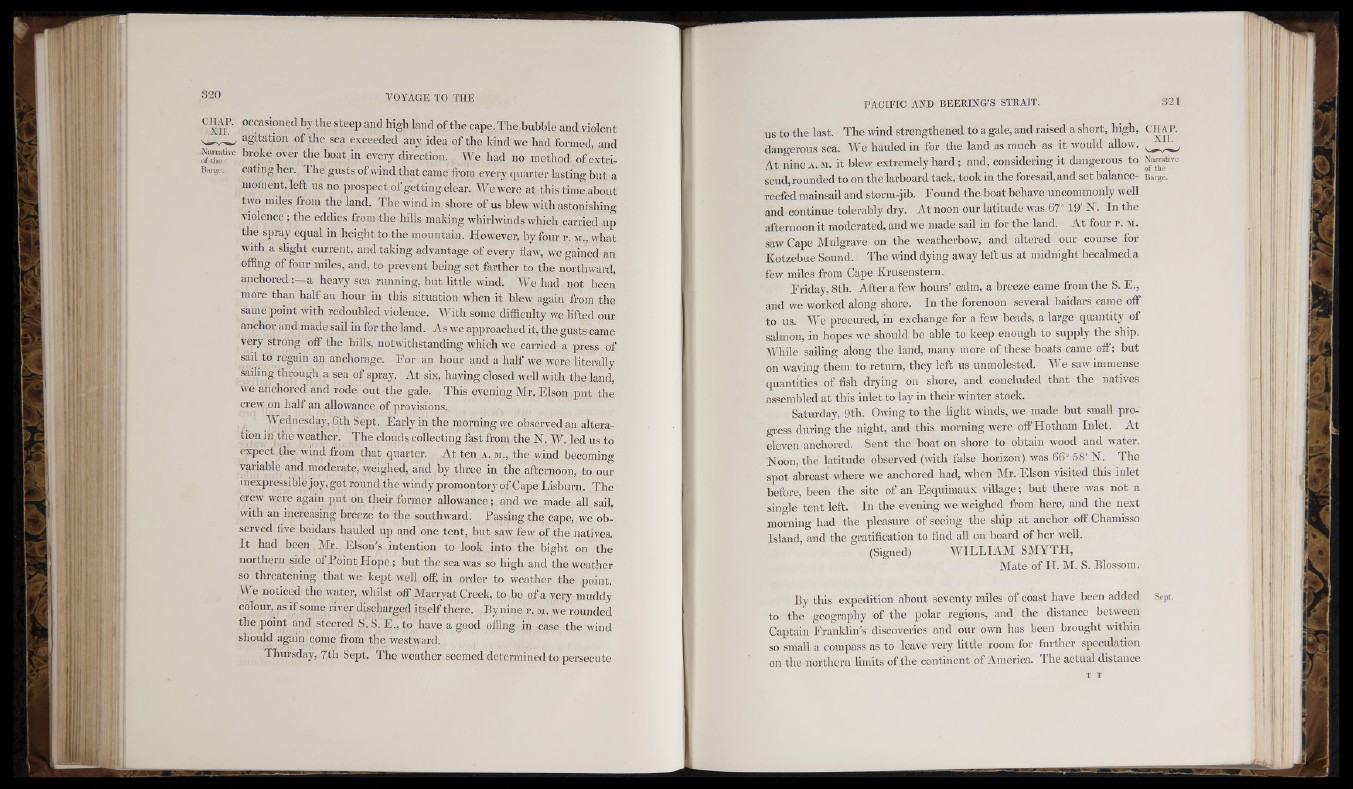
occasioned by the steep and high land of the cape. The bubble and violent
, agitation of the sea e.veeeded any idea of the kind we had formed, and
broke over the boat in every direction. YVe had no metliod of e.xtri-
cating her. 1 he gusts of wind that came from every quarter lasting but a
moment, left us no prospect of getting clear. YY"ewere at this time about
two miles from the land. The wind in shore of us blew with astonishing
violence ; the eddies from the hills making ivhirlwinds which carried up
the spray equal in height to the mountain. However, by four v. m., what
with a slight current, and taking advantage of every flaw, we gained an
offing of four miles, and, to prevent being set farther to the northward,
anchored:—a heavy sea running, but little wind. YY"e had not been
more than half an hour in this situation when it blew again from the
same point with redoubled violence. YVith some difficulty we lifted our
anchor and made sail in for the land. As we approached it, the gusts came
very strong off the hills, notwithstanding which we carried a press of
sail to regain an anchorage. For an hour and a half we w'ere literally
sailing through a sea of spray. At six, having closed well with the land,
we anchored and rode out the gale. This evening Mr. Elson put the
crew on half an allowance of provisions.
YYTdnesday, 6th Sept. Early in the morning we observed an alteration
in the weather. The clouds collecting fast from the N. YV. led us to
expect the wind from that quarter. At ten a . m ., the wind becoming
variable and moderate, weighed, and by three in the afternoon, to our
inexpressible joy, got round the windy promontory of Cape Lisburn. The
crew were again put on their former allowance; and we made all sail,
with an increasing breeze to the southward. Passing the cape, we observed
five baidars hauled up and one tent, but saw few of the natives.
It had been Mr. Elson’s intention to look into the bight on the
northern side of Point H ope; but the sea was so high and the weather
so threatening that we kept well off, in order to weather the jioint.
YY"e noticed the water, whilst off Marryat Creek, to be of a very muddy
colour, as if some river discharged itself there. liy nine p. m. wo rounded
the point and steered S. S. E., to have a good offing in case the wind
should again come from the westward.
Thursday, 7th Sept. The weather seemed determined to persecute
us to the last. The wind strengthened to a gale, and raised a short, high, CHAP.
dangerous sea. YVe hauled in for the land as much as it would aUow.
At nine a . m . it blew extremely hard ; and, considering it dangerous to
scud, rounded to on the larboard tack, took in the foresail, and set balance- Barge,
reefed mainsail and storm-jib. Found the boat behave uncommonly well
and continue tolerably dry. At noon our latitude was 67° 19'N. In the
afternoon it moderated, and we made sail in for the land. At four p. m.
saw Cape Mulgrave on the weatherbow, and altered our course for
Kotzebue Sound. The wind dying away left us at midnight becalmed a
few miles from Cape Krusenstern.
Friday, Sth. After a few hours’ calm, a breeze came from the S. E.,
and we worked along shore. In the forenoon several baidars came off
to us. YY"e procured, in exchange for a few beads, a large quantity of
salmon, in hopes we should be able to keep enough to supply the ship.
YVhile sailing along the land, many more of these boats came off; but
on waving them to return, they left us unmolested. YY"e saw immense
quantities of fish drying on shore, and concluded that the natives
assembled at this inlet to lay in their winter stock.
Saturday, 9th. Owing to the light winds, we made but small progress
during the night, and this morning were off Hotham Inlet. At
eleven anchored. Sent the boat on shore to obtain wood and water.
Noon, the latitude observed (with false horizon) was 66° 58' N . The
spot abreast w'here we anchored had, when Mr. Elson visited this inlet
before, been the site of an Esquimaux village; but there was not a
single tent left. In the evening we weighed from here, and the next
morning had the pleasure of seeing the ship at anchor off Chamisso
Island, and the gratification to find all on board of her well.
(Signed) YVILLIAM SMYTH,
Mate of H. M. S. Blossom.
By this expedition about seventy miles of coast have been added
to the geography of the polar regions, and the distance between
Captain Franklin’s discoveries and onr own has been brought within
so small a compass as to leave very little room for further speculation
on the northern limits of the continent of America. The actual distance
T T
Sept.
Ill